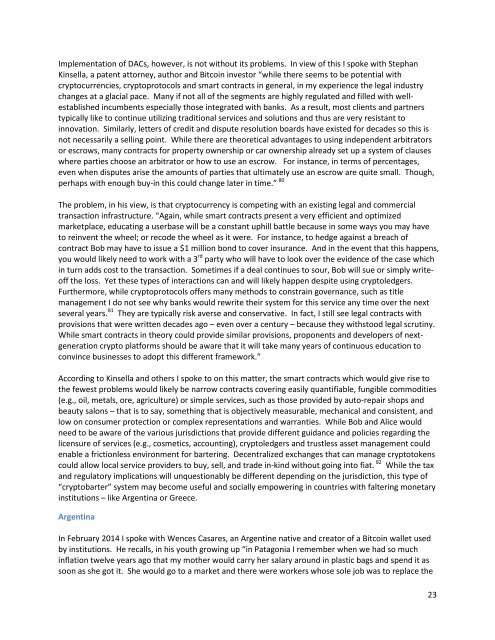Great+Chain+of+Numbers+A+Guide+to+Smart+Contracts,+Smart+Property+and+Trustless+Asset+Management+-+Tim+Swanson
Great+Chain+of+Numbers+A+Guide+to+Smart+Contracts,+Smart+Property+and+Trustless+Asset+Management+-+Tim+Swanson
Great+Chain+of+Numbers+A+Guide+to+Smart+Contracts,+Smart+Property+and+Trustless+Asset+Management+-+Tim+Swanson
Create successful ePaper yourself
Turn your PDF publications into a flip-book with our unique Google optimized e-Paper software.
Implementation of DACs, however, is not without its problems. In view of this I spoke with Stephan<br />
Kinsella, a patent attorney, author and Bitcoin investor “while there seems to be potential with<br />
cryptocurrencies, cryptoprotocols and smart contracts in general, in my experience the legal industry<br />
changes at a glacial pace. Many if not all of the segments are highly regulated and filled with wellestablished<br />
incumbents especially those integrated with banks. As a result, most clients and partners<br />
typically like to continue utilizing traditional services and solutions and thus are very resistant to<br />
innovation. Similarly, letters of credit and dispute resolution boards have existed for decades so this is<br />
not necessarily a selling point. While there are theoretical advantages to using independent arbitrators<br />
or escrows, many contracts for property ownership or car ownership already set up a system of clauses<br />
where parties choose an arbitrator or how to use an escrow. For instance, in terms of percentages,<br />
even when disputes arise the amounts of parties that ultimately use an escrow are quite small. Though,<br />
perhaps with enough buy-in this could change later in time.” 80<br />
The problem, in his view, is that cryptocurrency is competing with an existing legal and commercial<br />
transaction infrastructure. “Again, while smart contracts present a very efficient and optimized<br />
marketplace, educating a userbase will be a constant uphill battle because in some ways you may have<br />
to reinvent the wheel; or recode the wheel as it were. For instance, to hedge against a breach of<br />
contract Bob may have to issue a $1 million bond to cover insurance. And in the event that this happens,<br />
you would likely need to work with a 3 rd party who will have to look over the evidence of the case which<br />
in turn adds cost to the transaction. Sometimes if a deal continues to sour, Bob will sue or simply writeoff<br />
the loss. Yet these types of interactions can and will likely happen despite using cryptoledgers.<br />
Furthermore, while cryptoprotocols offers many methods to constrain governance, such as title<br />
management I do not see why banks would rewrite their system for this service any time over the next<br />
several years. 81 They are typically risk averse and conservative. In fact, I still see legal contracts with<br />
provisions that were written decades ago – even over a century – because they withstood legal scrutiny.<br />
While smart contracts in theory could provide similar provisions, proponents and developers of nextgeneration<br />
crypto platforms should be aware that it will take many years of continuous education to<br />
convince businesses to adopt this different framework.”<br />
According to Kinsella and others I spoke to on this matter, the smart contracts which would give rise to<br />
the fewest problems would likely be narrow contracts covering easily quantifiable, fungible commodities<br />
(e.g., oil, metals, ore, agriculture) or simple services, such as those provided by auto-repair shops and<br />
beauty salons – that is to say, something that is objectively measurable, mechanical and consistent, and<br />
low on consumer protection or complex representations and warranties. While Bob and Alice would<br />
need to be aware of the various jurisdictions that provide different guidance and policies regarding the<br />
licensure of services (e.g., cosmetics, accounting), cryptoledgers and trustless asset management could<br />
enable a frictionless environment for bartering. Decentralized exchanges that can manage cryptotokens<br />
could allow local service providers to buy, sell, and trade in-kind without going into fiat. 82 While the tax<br />
and regulatory implications will unquestionably be different depending on the jurisdiction, this type of<br />
“cryptobarter” system may become useful and socially empowering in countries with faltering monetary<br />
institutions – like Argentina or Greece.<br />
Argentina<br />
In February 2014 I spoke with Wences Casares, an Argentine native and creator of a Bitcoin wallet used<br />
by institutions. He recalls, in his youth growing up “in Patagonia I remember when we had so much<br />
inflation twelve years ago that my mother would carry her salary around in plastic bags and spend it as<br />
soon as she got it. She would go to a market and there were workers whose sole job was to replace the<br />
23


